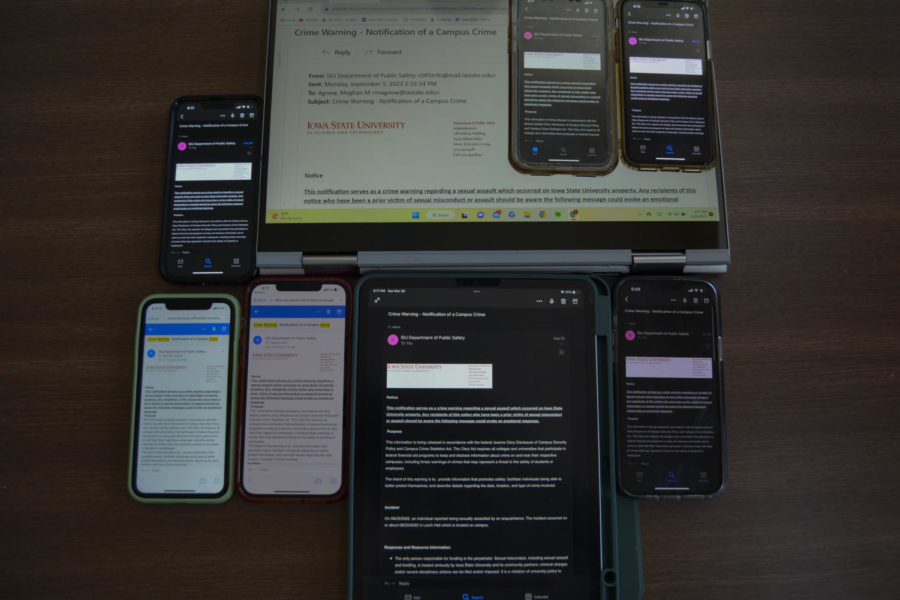Student opinion on required crime notifications
Crime warning email notifications pictured on March 26, 2023.
Every so often, members of the Iowa State Community receive an email notifying them of an ongoing threat or an update on a crime committed on campus. While these notifications are required by federal law, the emails leave some feeling assured and others frightened for their own safety.
Campus crime emails are sent out by Iowa State’s Public Safety Department, alerting the Iowa State Community of ongoing threats.
“The crime warnings that the department puts out are in response to the federal Clery Act,” said Alice Wisner, Iowa State’s Clery Compliance Manager. “There is a federal requirement as a part of the federal Clery Act that if there is a serious and ongoing threat to the campus community, it is our duty to let the campus community know what is going on.”
Campus crime emails are based on the timely manner that an incident is reported, but this amount of time varies between different institutions.
“The timely manner part of it is left up to each institution of higher learning, what they consider to be timely,” Wisner said. “At Iowa State we’ve settled on 10 days.”
Wisner said she knows of some institutions that say a month, and a few who do not have a limit, so if someone reported a crime that occurred a year ago, some institutions may issue a timely warning on it.
Although these emails are required by law to be sent out to the campus community, some situations cause more discomfort than others, including incidents of sexual assault.
“When I first got the email, or the first few that I got, I was super uncomfortable and freaking out,” said Sylvi Hanson, a freshman majoring in public relations. “Now, just because of how often we get them, the email doesn’t make it seem as big of a deal as the topic actually is.”
The university issues a crime notification any time a sexual assault is reported, in accordance with the U.S. Department of Education’s guidelines. Iowa State has had seven cases of sexual assault on or near campus in the 2022-23 academic year, six of which occurred in the fall 2022 semester.
“Sexual assault has been determined by the federal department of education to be a serious and ongoing threat,” Wisner said. “It doesn’t matter if it is a sexual assault that is perpetrated by a stranger or perpetrated by an acquaintance.”
With a serious subject like sexual assault, it can be difficult to balance the extent of information that is publicly made available. From Hanson’s perspective, providing extra details about an incident can help surrounding community members feel safer.
“I wish that they specified a location, like whether it was on a dorm floor, or in the elevator or staircase,” Hanson said. “Not that I would avoid the areas because they are hard to avoid if they are in your dorm, but it would just help ease whatever is going on.”
On the other hand, a limited crime report can offer more privacy to those who are involved.
“Personally, I air on the side of less information [in an email] just because the more information that’s given, the easier it is to identify someone,” said Octavia Grimes, a resident assistant (RA) in Geoffroy Hall and a senior studying industrial engineering. “For example, if it said Tiffany House in Geoffroy Hall, then that’s one of 47 kids instead of one of 700 some kids that we have in the building, and if someone is concerned about their identity being shared, then that is kind of narrowing in on them.”
Grimes has experienced one crime notification involving Geoffroy Hall. After this notification’s release, four out of the 47 students on her floor went and spoke to her about it.
“It’s not a large percentage, but each one of those people I did speak with individually and talk with them about what’s making them uncomfortable, reminding them to lock their doors, and ‘if you see something, say something,’” Grimes said.
Grimes said the main thing RAs do when approached about a campus crime email is ensure their residents feel safe and comfortable. They also do their best to determine if something specific is making them feel uneasy.
“What we try to remind people is that we are reporting it to make sure you know what’s happening so that you can feel more safe and know that we are addressing issues and addressing things when they are happening,” Grimes said.
Sometimes taking action after a crime notification can also spread farther than individual discussions. Depending on the community response, an RA may host a floor event or building meeting.
“What we do is we gauge interest on the floor,” Grimes said. “If multiple people are coming and engaging interest or concern, then we might hold a floor event, or if a lot of people through the building are expressing concern we might even talk to our hall directors about holding a hall-wide event.”
When these events are hosted, they are open to any individual who feels that listening in would help ease or acknowledge their discomfort. These events can include discussions about safety tips or what to look out for in a situation that might be dangerous or suspicious.
If someone is concerned or curious about an email that was sent out about a crime, or more specifically a sexual assault, there are ways to find out more information about the incident or following actions.
One of the requirements under the Clery Act is that the university must keep a crime log that is accessible to the public and available online for 60 days. People can walk into Iowa State’s Public Safety Department offices or walk into dispatch and request a copy of it, according to Wisner.
Wisner also said ISUPD offers a safety planning service that allows them to meet with an officer to go through concerns and receive tips.
Additional safety information can be found on the ISUPD website.
Your donation will support the student journalists of the Iowa State Daily. Your contribution will allow us to purchase equipment, send our student journalists to conferences and off-set their cost of living so they can continue to do best-in-the-nation work at the Iowa State Daily.











